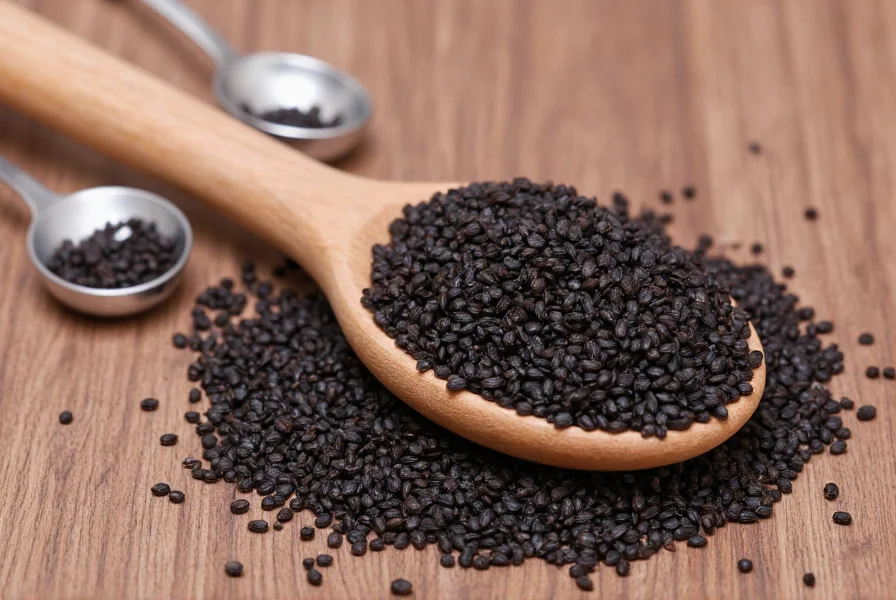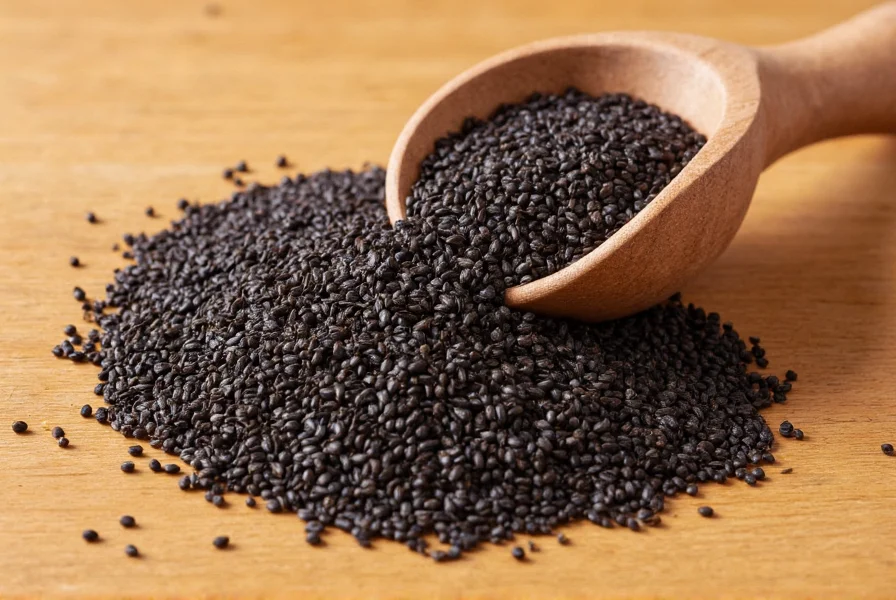Black cumin seeds have been used for thousands of years across Middle Eastern, Asian, and African cultures for both culinary and medicinal purposes. These tiny black seeds, scientifically known as Nigella sativa, pack a powerful nutritional profile that has captured the attention of modern researchers seeking to validate traditional health claims.
What Exactly Are Black Cumin Seeds?
Despite the similar name, black cumin seeds (Nigella sativa) are botanically distinct from regular cumin (Cuminum cyminum). Also called black seed, kalonji, or habbat al-barakah (blessed seed), these crescent-shaped black seeds come from a flowering plant in the Ranunculaceae family. Native to Southwest Asia, the plant produces delicate blue or white flowers that yield fruit pods containing the prized black seeds.
The confusion between black cumin and regular cumin stems from similar flavor profiles and culinary applications, but they differ significantly in appearance, chemical composition, and traditional uses. Black cumin seeds are smaller, black, and have a more complex flavor profile with notes of onion, oregano, and pepper, while regular cumin seeds are larger, brownish-yellow, and have a warmer, earthier taste.
Historical Significance and Traditional Uses
Archaeological evidence shows black cumin seeds were found in Egyptian pharaoh Tutankhamun's tomb, suggesting their importance in ancient Egyptian culture. Traditional medical systems including Ayurveda, Unani, and Islamic medicine have documented the use of black cumin seeds for various health conditions for over 2,000 years.
In traditional practices, people have used black cumin seeds to support respiratory health, digestive function, and skin conditions. The seeds were often crushed and mixed with honey or oil for topical application or consumed directly for internal benefits. This historical context provides valuable insight into the potential applications of black cumin seeds that modern science continues to investigate.
Nutritional and Chemical Composition
Black cumin seeds contain over 100 bioactive compounds, with thymoquinone being the most extensively studied. This compound demonstrates potent antioxidant and anti-inflammatory properties in laboratory studies. Other important components include:
| Compound | Natural Source | Reported Benefits |
|---|---|---|
| Thymoquinone | Primary active compound | Antioxidant, anti-inflammatory |
| Nigellone | Essential oil component | Respiratory support |
| Fixed oils | Fatty acid profile | Heart health support |
| Alkaloids | Natural plant compounds | Various physiological effects |
The seeds also provide dietary fiber, protein, and essential minerals including calcium, iron, and potassium. When comparing black cumin seeds nutrition facts to other seeds, they stand out for their unique phytochemical profile rather than macronutrient content.
Scientifically Researched Health Benefits
Modern research has begun to validate many traditional uses of black cumin seeds. While more human studies are needed, current evidence suggests potential benefits in several areas:
Immune System Support
Multiple studies indicate black cumin seeds may modulate immune function. Research published in the Journal of Ethnopharmacology found that thymoquinone enhances certain immune responses while reducing excessive inflammation. This dual action makes black cumin seeds particularly interesting for immune health.
Respiratory Health
Clinical trials have examined black cumin seeds for respiratory conditions. A study in the European Respiratory Journal reported that participants with allergic rhinitis who took black seed oil experienced significant improvement in symptoms compared to placebo. The anti-inflammatory properties appear to benefit airway function.
Metabolic Health
Research suggests black cumin seeds may support healthy blood sugar levels and lipid profiles. A meta-analysis in Complementary Therapies in Medicine concluded that black seed supplementation showed promise for improving markers of metabolic health, though researchers noted the need for larger, longer-term studies.
Skin Health Applications
Topical application of black seed oil has shown potential for various skin conditions. Studies indicate it may help with inflammatory skin conditions due to its antioxidant properties. Many people use diluted black seed oil for skincare as part of traditional beauty regimens.

How to Use Black Cumin Seeds Safely
Black cumin seeds offer versatility in both culinary and wellness applications. Here's how to incorporate them safely into your routine:
Culinary Applications
In Middle Eastern and Indian cuisines, black cumin seeds are commonly used as a spice. Try these methods:
- Add whole seeds to bread dough before baking
- Toast seeds lightly and sprinkle over roasted vegetables
- Use in curry blends and spice mixes
- Infuse in oil for salad dressings
Traditional Preparation Methods
Traditional preparations often involve:
- Mixing crushed seeds with honey for daily consumption
- Creating oil infusions for topical application
- Brewing as a tea (though this extracts fewer active compounds)
Dosage Guidelines
Research studies have used varying amounts, but typical recommendations include:
- 1-2 grams of whole seeds daily (about 1-2 teaspoons)
- 500-1000 mg of standardized extract
- 1-2 mL of black seed oil
Always start with lower amounts to assess tolerance. Consult a healthcare provider before using black cumin seeds medicinally, especially if you have health conditions or take medications.
Safety Considerations and Potential Side Effects
While generally safe when consumed in food amounts, black cumin seeds may cause issues in certain situations:
- Pregnancy and breastfeeding: Avoid medicinal amounts due to potential uterine stimulation
- Surgery: Discontinue at least 2 weeks before surgery due to potential blood sugar effects
- Medication interactions: May interact with blood pressure medications, diabetes drugs, and immunosuppressants
- Allergic reactions: Rare but possible, especially in those sensitive to plants in the Ranunculaceae family
Most adverse effects occur with excessive consumption. Typical culinary use presents minimal risk for most people. If using black cumin seeds for specific health concerns, work with a qualified healthcare provider to determine appropriate dosage and duration.
Black Cumin Seeds vs. Black Seed Oil
Many people wonder about the difference between whole black cumin seeds and black seed oil. While both come from Nigella sativa, they offer different benefits:
- Whole seeds: Provide fiber and require digestion to release active compounds
- Black seed oil: Concentrated source of thymoquinone and other fat-soluble compounds
- Extraction method matters: Cold-pressed oil preserves more active compounds than solvent-extracted versions
Research suggests the oil may deliver higher concentrations of certain beneficial compounds, but whole seeds provide additional nutritional benefits from the fiber and other components. For specific health goals, one form may be more appropriate than the other.

Quality Considerations When Purchasing
Not all black cumin products offer the same quality. When selecting black cumin seeds or oil:
- Look for organic certification to avoid pesticide residues
- Choose cold-pressed oil for maximum nutrient retention
- Check for freshness dates - seeds lose potency over time
- Store in airtight containers away from light and heat
- Be wary of extremely low-priced products which may be adulterated
Authentic black cumin seeds should have a distinctive aroma and flavor. If purchasing oil, it should have a deep amber color and slightly pungent smell. Proper storage extends shelf life and preserves the beneficial compounds.
Conclusion: Current Understanding of Black Cumin Seeds
Black cumin seeds represent a fascinating intersection of traditional wisdom and modern science. While research continues to evolve, current evidence supports many traditional uses while highlighting the need for more rigorous human studies. When incorporated as part of a balanced approach to wellness, black cumin seeds offer a safe and potentially beneficial addition to daily routines for most people.
As with any natural remedy, realistic expectations are important. Black cumin seeds are not a miracle cure but rather one component of a holistic approach to health that includes proper nutrition, exercise, and appropriate medical care when needed. The growing body of research suggests these ancient seeds deserve their place in modern wellness practices.











 浙公网安备
33010002000092号
浙公网安备
33010002000092号 浙B2-20120091-4
浙B2-20120091-4